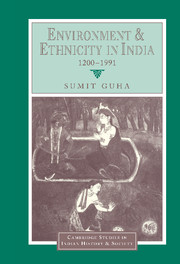Book contents
- Frontmatter
- Contents
- List of maps
- List of tables
- Acknowledgements
- Glossary
- List of abbreviations
- Introduction
- 1 From the archaeology of mind to the archaeology of matter
- 2 Subsistence and predation at the margins of cultivation
- 3 State formation in the highland forests 1350–1800
- 4 The peoples of the Sahyadri under Marathas and British
- 5 The central Indian forest from Mughal suzerainty to British control
- 6 The central Indian forest under early British rule
- 7 Identities and aspiration – not noble savage but savage noble
- 8 The high colonial period and after – new patterns of authority and power
- 9 From sanctuaries to safeguards: policies and politics in twentieth-century India
- Conclusion
- Afterword
- Bibliography
- Index
1 - From the archaeology of mind to the archaeology of matter
Published online by Cambridge University Press: 12 November 2009
- Frontmatter
- Contents
- List of maps
- List of tables
- Acknowledgements
- Glossary
- List of abbreviations
- Introduction
- 1 From the archaeology of mind to the archaeology of matter
- 2 Subsistence and predation at the margins of cultivation
- 3 State formation in the highland forests 1350–1800
- 4 The peoples of the Sahyadri under Marathas and British
- 5 The central Indian forest from Mughal suzerainty to British control
- 6 The central Indian forest under early British rule
- 7 Identities and aspiration – not noble savage but savage noble
- 8 The high colonial period and after – new patterns of authority and power
- 9 From sanctuaries to safeguards: policies and politics in twentieth-century India
- Conclusion
- Afterword
- Bibliography
- Index
Summary
Static societies, changeless races
As K. Sivaramakrishnan recently pointed out, one of the persistent ironies of postcoloniality ‘has been the way elites assuming the task of building a national culture and providing it with a liberatory/progressive history have turned to modes of knowledge and reconstruction produced in the colonial period’. And of the varied strands that have constituted the twentieth-century colonial and postcolonial knowledge of India, none is more central than the notion of the timeless, conservative caste, and its antediluvian ancestor, the unchanging primitive tribe. The Asians, being a non-progressive people, did not change – they merely accumulated, with the latest addition to the population overlying its predecessor, much as geological strata did. The missionary ethnographer John Wilson was one of the earliest proponents of this idea, suggesting in 1854 that conquered indigenous tribes were incorporated into ‘Aryan’ society as lower castes. Elsewhere, he wrote that the ‘Depressed Aboriginal Tribes’ were ‘evidently the remains of nationalities subdued and long grievously oppressed and abhorred by those who have been their conquerors, and have held themselves in every respect to be their superiors. I refer to such tribes as the Dheds of Gujarat, the Mahars or Parvaris and Mangs of the Maratha country and the Bedars of the Southern Maratha Country.’ He then went on to make a laboured and unconvincing effort to trace the Dheds to the Daradas and to make the Mahars the source of the regional name Maharashtra.
- Type
- Chapter
- Information
- Environment and Ethnicity in India, 1200–1991 , pp. 10 - 29Publisher: Cambridge University PressPrint publication year: 1999

